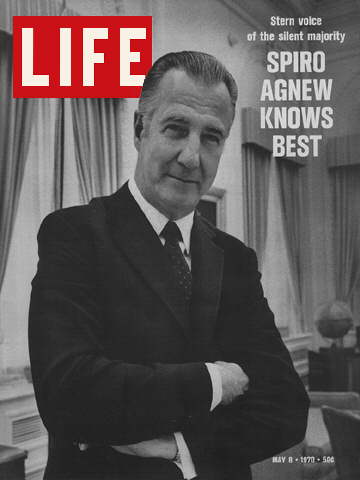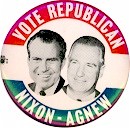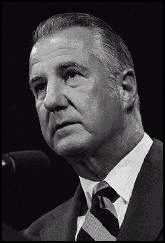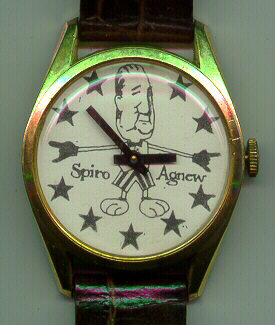Spiro T. Agnew
 Sure, it's bad to be remembered as an evil and corrupt politician. But what's really bad is to be remembered as a mediocre evil and corrupt politician.
Sure, it's bad to be remembered as an evil and corrupt politician. But what's really bad is to be remembered as a mediocre evil and corrupt politician.
In all fairness, Spiro T. Agnew really never had a chance. You don't put your kid on the path to greatness by naming him "Spiro."
Long before Michael Dukakis made it unfashionable, Agnew was the son of Greek immigrants. On the bright side, he looked more at home in a tank. He served in the Army in World War II, a company commander in an armored division, with actual fighting and everything, and he reupped for a year in Korea.
After the military, Agnew became a lawyer in his home town of Baltimore. He took an interest in politics, first becoming involved at the county level, then running for governor of Maryland in 1966. This was not as big a leap as it might sound, since Maryland is pretty much all Baltimore, but still, progress is progress.
Agnew beat his conservative Democratic candidate on a platform of relative liberalism. As governor, Agnew was a fairly moderate guy, initiating programs to assist the needy, a sliding-scale income tax, and open housing laws.
He also instituted programs to assist needy governors of Maryland named Spiro Agnew. As governor, Agnew took kickbacks from major contractors in Maryland, although he never, ever, EVER admitted that. The payments, which Agnew forever insisted were legitimate campaign contributions, came in small bills in unmarked envelopes, totaling at the minimum some $200,000 plus.
In 1968, no one really was talking about this retirement plan however. When uncharismatic, uninspired, evil presidential candidate Richard M. Nixon decided to blaze a trail back into national politics over the corpse of John F. Kennedy in 1968, he needed a very special individual as his running mate.
 Nixon picked Agnew, the liberal governor of a small state, and transformed him into an arch-conservative attack dog the likes of which the nation had not seen since... Well, since Richard Nixon.
Nixon picked Agnew, the liberal governor of a small state, and transformed him into an arch-conservative attack dog the likes of which the nation had not seen since... Well, since Richard Nixon.
Agnew was sent out on the campaign trail, and later as vice president, to attack the hippies, leftists and pinkos that Nixon felt were primarily responsible for the decline of America (which couldn't possibly have been his fault). Armed with a series of ad hominem zingers penned by Nixon's sleaze purveyors Pat Buchanan and William Safire, Agnew made many memorable contributions to the history of destructo-politics with gems like these:
 "A Nixon-Agnew administration will abolish the credibility gap and reestablish the truth — the whole truth — as its policy."
"A Nixon-Agnew administration will abolish the credibility gap and reestablish the truth — the whole truth — as its policy."
"(The media) are an effete corps of impudent snobs, a tiny fraternity of privileged men elected by no one and enjoying a monopoly sanctioned and licensed by the government. They are nattering nabobs of negativism."
"Ultraliberalism today translates into a whimpering isolationism in foreign policy, a mulish obstructionism in domestic policy, and a pusillanimous pussyfooting on the critical issue of law and order."
"The criminal left is not a problem to be solved by the Department of Philosophy or the Department of English--it is a problem for the Department of Justice.... Black or white, the criminal left is interested in power. It is not interested in promoting the renewal and reforms that make democracy work; it is interested in promoting those collisions and conflict that tear democracy apart."
"A spirit of national masochism prevails, encouraged by an effete corps of impudent snobs who characterize themselves as intellectuals."
"(Whomever he was attacking this particular day were) the hopeless, hysterical hypochondriacs of history."
"If you've seen one city slum you've seen them all."
Needless to say, these shitbombs of malicious nonsense didn't exactly endear Agnew to the young people, or just about anyone else either. Agnew quickly went from small-time politico to national punchline. The image of "buffoon" was rarely invoked so easily as by mentioning Agnew's name, although he commented in an interview once that his attack-dog role was the most "virile" of his vice presidential duties.
Everyone knows how the story of the Nixon administration turned out, of course, and Agnew was one of its first casualties. As Watergate relentlessly worked its way into the national vocabulary, Agnew's Maryland kickbacks suddenly took on a very high profile and new charges surfaced that he was still taking bribes as vice president.
Agnew called the allegations of bribery "damned lies" and vowed never to resign the vice presidency. Then he resigned.
OK, maybe it wasn't quite as abrupt as all that, but it was close. Agnew stepped down on Oct. 10, 1973, just under a year before his boss would do the same. Unlike Nixon, Agnew had to face the music. Sort of.
This was, after all, only the beginning of the modern era of criminal presidencies, and at the time, there wasn't a huge zest for dragging the secondmost powerful man in American politics through the gutters.
 On the same day he stepped down, Agnew copped a "no contest" plea to charges of tax evasion, which basically means admitting you have done nothing wrong except that you're pretty sure you would get convicted by a jury of your peers. (The tax evasion charge always cracks me up, whether it's Al Capone or Spiro Agnew. I mean, would they have been just fine if they'd itemized their criminal incomes?)
On the same day he stepped down, Agnew copped a "no contest" plea to charges of tax evasion, which basically means admitting you have done nothing wrong except that you're pretty sure you would get convicted by a jury of your peers. (The tax evasion charge always cracks me up, whether it's Al Capone or Spiro Agnew. I mean, would they have been just fine if they'd itemized their criminal incomes?)
Agnew was fined a measly $10,000, sentenced to three years probation and disbarred. A later civil suit ordered him to make nearly $300,000 restitution to the state of Maryland.
After the vice presidency, Agnew wallowed in self-righteous dudgeon for a while, penning a mean-spirited but utterly non-titillating autobiography called "Go Quietly... Or Else," in which he unsuccessfully tried to portray himself as a victim of the Nixon administration's other foibles.
He worked the rest of his life as a "business consultant" which is political code for "he was taken care of by his former political patrons," and died in 1996 at the age of 77. Had he lived just a little while longer, he would have enjoyed the grim satisfaction of watching Bill Clinton get impeached for Oral Sex. No doubt, he would have been welcomed back to the fold as a talking head on TV news programs, perhaps winning belatedly the pity that he so badly wanted but never really deserved.
Fun fact! The letters Spiro Agnew may be rearranged to spell grow a penis. This is surely no coincidence.
Bribery allegations
Interview with Lester Matz (Justice Department transcript):
|
"Sometime in 1970, or early 1971, Matz received a telephone call from Jones who advised him that there was an upcoming federal job that the Vice-President would control. This job would generate something in the order of $100,000 in fees, and Jones advised Matz that a payment would be necessary. This job was the (blacked out) and Matz wanted it to go to (blacked out). The job was awarded to (blacked out) He then approached his partner in ( blacked out) for the purpose of advising him that he (Matz) had committed them to make a 5% payment to Mr. Agnew, (blacked out) finally agreed to contribute $1,000. Matz arranged an appointment with Mr. Agnew and Jones in the Vice-President's office in Washington. He then arranged to meet with (blacked out) in Washington just before his appointment with the Vice-President. Matz met with ( blacked out)across the street from the EOB (Executive Office Building) and there received from (blacked out) $1,000 in cash. Matz added $1,500 in cash and placed the entire sum in an envelope which he took with him to his meeting with Jones and the Vice-President. (blacked out) has been interviewed and confirms Matz's recollection of these events. We have the check by which he generated the $1,000.
Matz met with Jones and the Vice-President and placed the envelope on the Vice-President's desk saying that this was the money for the job. By the time Matz left this meeting, neither Jones nor the Vice-President had removed the envelope from the desk.
EOB logs show that Matz met with the Vice-President on April 20, 1971, and this date corresponds with the date on the check that (blacked out) used to generate his share of the payment. To the extent that we understand the EOB logs, however, they do not confirm that Jones met with the Vice-President on this date. (blacked out) is attempting to obtain clarification of some of the documents supplied to us by the Secret service, and we are pursuing the matter."
|
This never went to trial. But it's a safe bet that Agnew was even more crooked than his boss Richard M. Nixon.
Timeline
| 1897 |
Father, Theodore Spiro Anagnostopoulos, emigrates from Greece. |
| 9 Nov 1918 |
Spiro T. Agnew born, Baltimore MD. |
| 27 May 1942 |
Marries insurance company employee Elinor (Judy) Isabel Judefind. |
| 1947 |
Law degree, University of Baltimore. |
| 1962 |
Elected County Executive (highest office) of Baltimore County, MD. |
| 1967 |
Elected governor of Maryland. |
| 1967 |
Received $29,500 in income which he failed to report. |
| 1968 |
Pointing to a sleeping Japanese-American reporter, Gene Oishi of The Baltimore Sun, Agnew asks "What's the matter with the fat Jap?" |
| 22 Jan 1969 |
Inaugurated as Richard M. Nixon's Vice President. |
| Sep 1970 |
Son, James Agnew, "denied published reports that he was living with a male owner of a Baltimore beauty salon." Long Road to Freedom. "To confirm the rumors he'd heard about James Agnew’s new living quarters, Anderson himself went to the hairdresser’s home in Baltimore, knocked on the door, and saw James Agnew there, though Agnew would later say he was just visiting. The column never mentioned the words gay or homosexual but Anderson’s implications were clear." Michelangelo Signorile. |
| 19 Mar 1971 |
One of the finest examples of Doublespeak ever uttered: "Contrary to reports that you noticed in the last day or so in the papers, this was not a rout. This was an orderly retreat." |
| 10 Oct 1973 |
Resigns the office of Vice President. Gerald Ford assumes the office. |
| 1974 |
Maryland Court of Appeals disbars Spiro T. Agnew. |
| 1983 |
Pays the State of Maryland $268,482 (the dollar amount of bribes he was known to have received.) |
| 17 Sep 1996 |
Spiro T. Agnew dies of liver cancer, Berlin MD. Buried in Timonium, MD. |
|
 Sure, it's bad to be remembered as an evil and corrupt politician. But what's really bad is to be remembered as a mediocre evil and corrupt politician.
Sure, it's bad to be remembered as an evil and corrupt politician. But what's really bad is to be remembered as a mediocre evil and corrupt politician.  Nixon picked Agnew, the liberal governor of a small state, and transformed him into an arch-conservative attack dog the likes of which the nation had not seen since... Well, since Richard Nixon.
Nixon picked Agnew, the liberal governor of a small state, and transformed him into an arch-conservative attack dog the likes of which the nation had not seen since... Well, since Richard Nixon.  "A Nixon-Agnew administration will abolish the credibility gap and reestablish the truth — the whole truth — as its policy."
"A Nixon-Agnew administration will abolish the credibility gap and reestablish the truth — the whole truth — as its policy." On the same day he stepped down, Agnew copped a "no contest" plea to charges of tax evasion, which basically means admitting you have done nothing wrong except that you're pretty sure you would get convicted by a jury of your peers. (The tax evasion charge always cracks me up, whether it's
On the same day he stepped down, Agnew copped a "no contest" plea to charges of tax evasion, which basically means admitting you have done nothing wrong except that you're pretty sure you would get convicted by a jury of your peers. (The tax evasion charge always cracks me up, whether it's